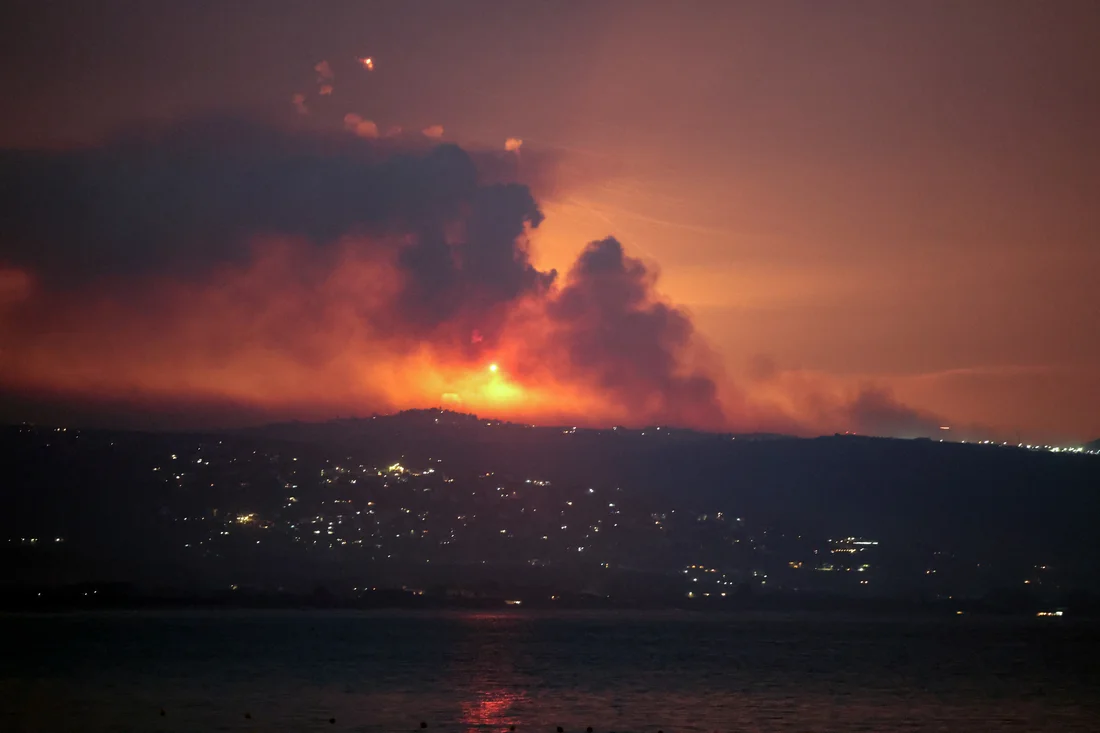In one of the most significant escalations in over 10 months of border conflict, Hezbollah launched hundreds of rockets and drones at Israel early Sunday. Israel responded with strikes from around 100 jets aimed at thwarting a larger assault from Lebanon.
Missiles streaked through the dawn sky, leaving dark trails behind them as air raid sirens blared in Israel. A distant explosion briefly illuminated the horizon, while smoke rose above homes in Khiam, southern Lebanon.
Lebanon confirmed three fatalities, while one person was reported dead in Israel, though the damage appeared limited.
While Hezbollah indicated it is not planning further strikes for now, and Israel’s foreign minister stressed that a full-scale war is not the goal, Prime Minister Benjamin Netanyahu issued a warning: “This is not the end of the story.”
Both sides have exchanged messages suggesting neither wants to escalate the situation further, with diplomats noting that the situation is considered “settled” for the time being.
However, any major spillover from this conflict, which has unfolded alongside the ongoing Gaza war, could ignite a broader regional confrontation involving Hezbollah’s backer, Iran, and Israel’s key ally, the United States.
Hezbollah claimed responsibility for launching 320 Katyusha rockets in retaliation for Israel’s assassination of senior commander Fuad Shukr last month. The group delayed this response to allow time for ceasefire talks in Gaza, with a Hezbollah official stating that their measured response was intended to avoid triggering a larger conflict. The group added that additional actions in response to Shukr’s killing would unfold gradually.
Netanyahu stated that Israel had preemptively targeted Hezbollah, with the Israeli military reporting strikes on 40 launch sites in response to anticipated attacks.
Suspended Flights and Emergency Measures
Tensions had been rising since a missile strike in the Israeli-occupied Golan Heights last month killed 12 young people, followed by Israel’s assassination of Shukr in Beirut.
Israel’s security cabinet convened early Sunday, with the full cabinet meeting later in the day. Defense Minister Yoav Gallant declared a state of emergency, while Foreign Minister Israel Katz reiterated Israel’s stance of responding based on ground developments but avoiding full-scale conflict.
“We are determined to do everything to defend our country,” Netanyahu said, emphasizing that “whoever harms us – we harm them.”
Lebanon’s caretaker Prime Minister Najib Mikati also held an emergency meeting with cabinet ministers. Hezbollah leader Hassan Nasrallah is scheduled to address the situation on television later on Sunday.
Flights to and from Tel Aviv’s Ben Gurion Airport were temporarily halted for about 90 minutes. Meanwhile, flights in and out of Beirut were also disrupted, leaving passengers stranded. “I just want to get out of here by any means possible,” said Rana Saade, a Lebanese resident of New Jersey.
Rising Tensions and Regional Risks
Warning sirens rang out in northern Israel as the Iron Dome system intercepted incoming rockets from southern Lebanon. Authorities advised people to limit gatherings, though restrictions were later lifted, and workplaces were allowed to operate as long as air raid shelters were accessible.
Reports indicated that houses in northern Israel sustained damage. “Israel should continue with preemptive strikes, and if Hezbollah persists, strike hard to neutralize the threat for good,” said Yuval Peleg, 73, from Haifa.
The Israeli military confirmed that a naval soldier was killed and two others wounded. In Lebanon, sources reported that at least 40 Israeli airstrikes hit various towns in the south in one of the heaviest bombardments since the hostilities began in October.
Hezbollah reported the deaths of two of its fighters in al-Tiri, while the allied Shi’ite group Amal stated that one of its members was killed in Khiam.
Residents in southern Lebanon described the intensity of the attacks. “I woke up to the sound of planes and explosions – it felt like the apocalypse,” said a resident of Zibqeen.
Global Concerns and Calls for Restraint
U.S. President Joe Biden is closely monitoring the situation. “We will continue supporting Israel’s right to defend itself while working toward regional stability,” said National Security Council spokesperson Sean Savett. Although the United States did not participate in Sunday’s strikes, it provided intelligence regarding Hezbollah’s planned attacks, according to a U.S. official.
The U.N. peacekeeping force in Lebanon and the U.N.’s special coordinator called for all sides to cease fire, expressing deep concern over the escalating conflict. Egypt, involved in mediating the Gaza ceasefire, warned of the dangers posed by opening another front in Lebanon.
Since Hezbollah initially attacked Israel following Hamas’s October 7 assault, both sides have engaged in a cycle of fire without triggering a full-scale escalation—until now. The recent shift began with the strike in the Golan Heights, which Hezbollah denied involvement in, followed by Shukr’s assassination.
Shukr’s death was quickly followed by the assassination of Hamas political leader Ismail Haniyeh in Tehran, sparking vows of revenge from Iran against Israel.


